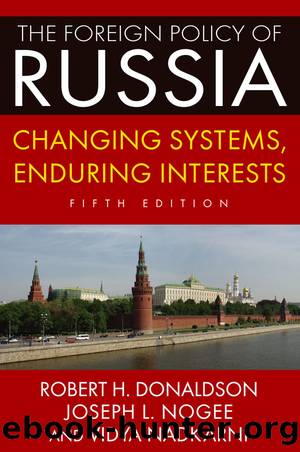The Foreign Policy of Russia by Donaldson Robert H Nogee Joseph L

Author:Donaldson, Robert H, Nogee, Joseph L
Language: eng
Format: epub
ISBN: 9781317456827
Publisher: Taylor and Francis
This hard line gave way as part of the change in Russia’s foreign policy line under Putin, particularly as Russia found it advisable to align with the West in the war against terrorism. As a realist, Putin accepted the incorporation of the Baltic states, not only into the European Union (which took place on May 1, 2004) but in NATO as well (on March 29, 2004). Their NATO membership further exacerbated Moscow’s relations with the Baltic states. NATO’s decision to patrol the airspace over its newest members was vigorously condemned by Russia’s military as “unfriendly.”156
Only with Lithuania was there improvement in relations in the spring of 2004. For months Russia and Lithuania had been at loggerheads once again over the rules that would govern the transit of Russians across Lithuania as they traveled to and from Kaliningrad. After May 1, the border being crossed would be not simply Lithuania’s, but that of the European Union, and Brussels was reluctant to allow Russian travelers and goods to enter the EU visa-free. By agreeing not to require visas (though issuing instead “facilitated travel documents”), Vilnius met a central criterion of Russian negotiators. In return, the Russian parliament, after years of delay, ratified a treaty signed in 1997 that formally established the border between the two countries.
Lithuanian relations with Russia, which had been warm since the mid-2000s, turned frosty in early 2007, when Lithuania, accusing Russia of “energy blackmail,” vetoed Russia-EU talks on a new Partnership and Cooperation Agreement, which it finally lifted in June 2008. Then in 2010, on the sixty-fifth anniversary of the end of World War II, Lithuania renewed demands for monetary compensation from Russia for the Soviet occupation. In 2012, Lithuania accused Gazprom of monopoly practices and spearheaded an EU initiative to investigate the company, angering Moscow. Russia has responded by using the energy weapon in economically crippling ways. Lithuania is dependent on Russia for 100 percent of its gas and 60 percent of its electricity and has a long-term supply contract with Gazprom until 2015. Gazprom also has an ownership stake in Lithuania’s gas distribution network. Following the practice of making countries with policies unsympathetic to Russia pay more for energy, Gazprom successively raised its gas prices, with a 450 percent increase over seven years. Lithuania pays a higher rate than its neighbors, Latvia and Estonia, and about 20 percent more than Germany. Lithuanian President Dalia Grybauskaite, who assumed the six-month-long rotating EU presidency on July 1, 2013, has ardently promoted the EU’s Eastern Partnership, further risking Russia’s ire. Her efforts toward supply diversification are not likely in the shortterm to break the Russian energy stranglehold on Lithuania.157 Russia flexed its economic muscles in October 2013 ahead of an EU summit in November 2013 to be hosted by Lithuania aimed at promoting closer ties with post-Soviet states that are not members of the EU. Moscow’s response was swift. Citing quality concerns, Russia’s consumer protection agency suspended Lithuanian dairy imports. The ban is likely to hurt the Lithuanian economy, which according to Russian data, exports 85 percent of its dairy products to Russia.
Download
This site does not store any files on its server. We only index and link to content provided by other sites. Please contact the content providers to delete copyright contents if any and email us, we'll remove relevant links or contents immediately.
| Arms Control | Diplomacy |
| Security | Trades & Tariffs |
| Treaties | African |
| Asian | Australian & Oceanian |
| Canadian | Caribbean & Latin American |
| European | Middle Eastern |
| Russian & Former Soviet Union |
The Secret History by Donna Tartt(16606)
The Social Justice Warrior Handbook by Lisa De Pasquale(11485)
Thirteen Reasons Why by Jay Asher(7780)
This Is How You Lose Her by Junot Diaz(5753)
Weapons of Math Destruction by Cathy O'Neil(5029)
Zero to One by Peter Thiel(4816)
The Myth of the Strong Leader by Archie Brown(4785)
Promise Me, Dad by Joe Biden(4440)
Stone's Rules by Roger Stone(4412)
Beartown by Fredrik Backman(4403)
How Democracies Die by Steven Levitsky & Daniel Ziblatt(4392)
The Fire Next Time by James Baldwin(4336)
100 Deadly Skills by Clint Emerson(4070)
A Higher Loyalty: Truth, Lies, and Leadership by James Comey(4024)
Rise and Kill First by Ronen Bergman(4008)
The David Icke Guide to the Global Conspiracy (and how to end it) by David Icke(3875)
The Farm by Tom Rob Smith(3869)
Secrecy World by Jake Bernstein(3773)
The Doomsday Machine by Daniel Ellsberg(3725)
